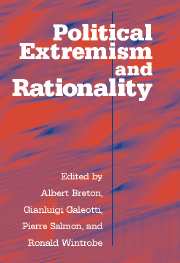Crossref Citations
This Book has been
cited by the following publications. This list is generated based on data provided by Crossref.
Wintrobe, Ronald
2003.
Rational Foundations of Democratic Politics.
p.
125.
2003.
Ouvrages reçus.
Revue économique,
Vol. 54,
Issue. 4,
p.
887.
Pittel, Karen
and
Rübbelke, Dirk T.G.
2006.
What Directs a Terrorist?.
Defence and Peace Economics,
Vol. 17,
Issue. 4,
p.
311.
Goodwin, Matthew J.
2006.
THE RISE AND FAULTS OF THE INTERNALIST PERSPECTIVE IN EXTREME RIGHT STUDIES.
Representation,
Vol. 42,
Issue. 4,
p.
347.
Klein, Adam
2012.
Slipping Racism into the Mainstream: A Theory of Information Laundering.
Communication Theory,
Vol. 22,
Issue. 4,
p.
427.
Kailitz, Steffen
2013.
Handwörterbuch zur Gesellschaft Deutschlands.
p.
244.
Kailitz, Steffen
and
Mannewitz, Tom
2015.
Handbuch Vergleichende Politikwissenschaft.
p.
1.
Abulof, Uriel
2015.
The malpractice of “rationality” in international relations.
Rationality and Society,
Vol. 27,
Issue. 3,
p.
358.
Kailitz, Steffen
and
Mannewitz, Tom
2016.
Handbuch Vergleichende Politikwissenschaft.
p.
585.
Schmitt, Josephine B
Rieger, Diana
Rutkowski, Olivia
and
Ernst, Julian
2018.
Counter-messages as Prevention or Promotion of Extremism?! The Potential Role of YouTube.
Journal of Communication,
Vol. 68,
Issue. 4,
p.
780.
Ning, Bo
Rind, Irfan Ahmed
and
Asad, Muhammad Mujtaba
2020.
Influence of Teacher Educators on the Development of Prospective Teachers’ Personal Epistemology and Tolerance.
SAGE Open,
Vol. 10,
Issue. 1,
p.
215824402091463.
Rajabi, Amirarsalan
Talebzadehhosseini, Seyyedmilad
and
Garibay, Ivan
2021.
Proceedings of the 2019 International Conference of The Computational Social Science Society of the Americas.
p.
29.
Frankenberger, Rolf
and
Heinrich, Gudrun
2022.
Politikwissenschaft trifft Politikdidaktik.
p.
47.
Frankenberger, Rolf
Baur, Reiner
Rieger-Ladich, Markus
Schmid, Josef
Stauber, Barbara
Thiel, Ansgar
and
Thomas, Tanja
2023.
Researching far right extremism—a transdisciplinary, lifeworld, and political culture perspective.
Zeitschrift für Vergleichende Politikwissenschaft,
Vol. 17,
Issue. 3,
p.
275.
Rind, Irfan Ahmed
and
Ning, Bo
2024.
Pre-service Teacher Education Reforms: An Attempt to Make Pakistan a Tolerant Society.
The Asia-Pacific Education Researcher,
Vol. 33,
Issue. 2,
p.
383.





